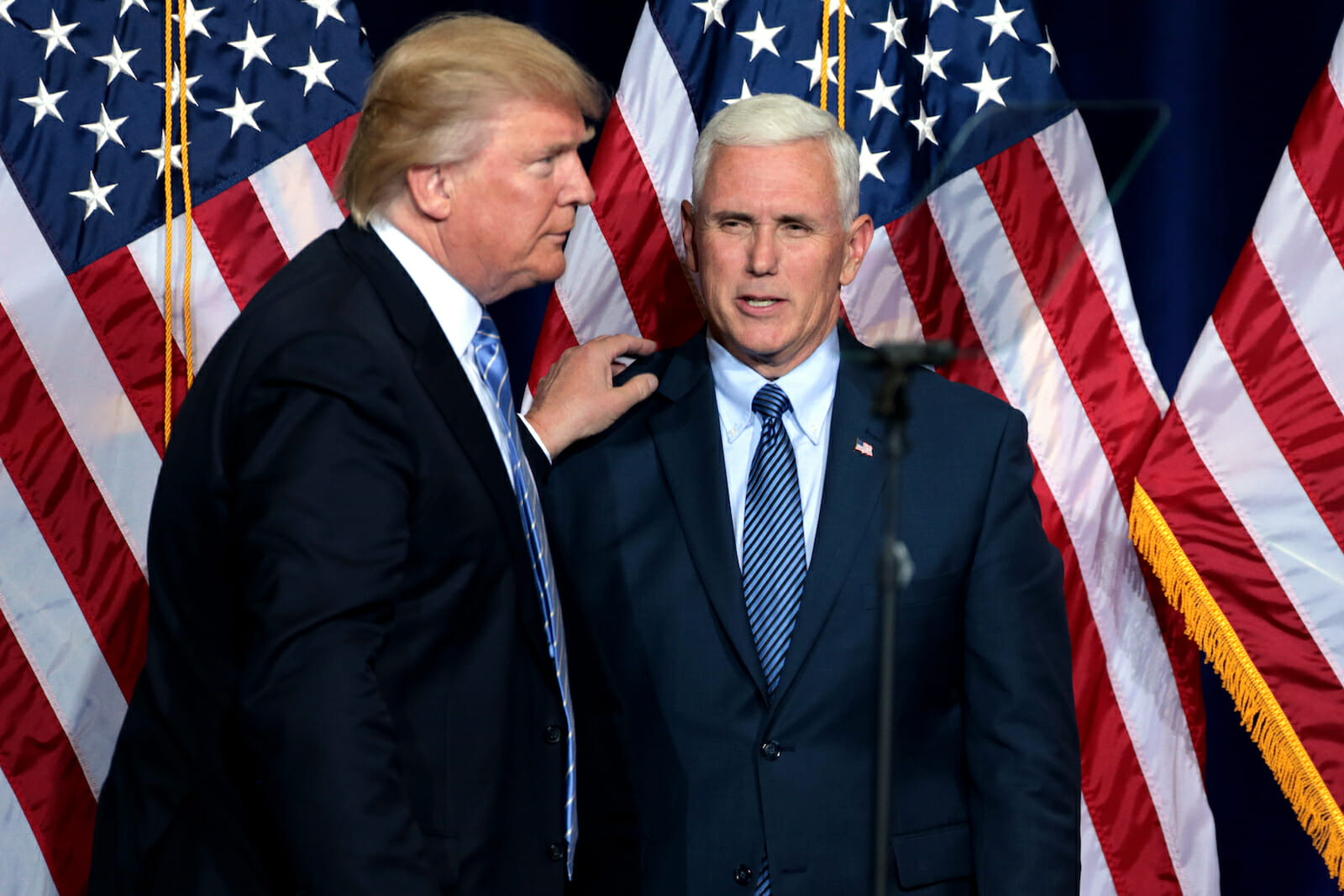
Politics
Why Donald Trump Must Win: An Outsider’s Perspective
Who’s afraid of a Trump presidency? God knows I am. I’m on an H-1B work visa. I may have taken this job away from an American citizen. I would like to make the argument for the Donald, not because I think his policies would be beneficial to society and the world, but because they won’t. Allow me to explain.
Some of my students who have taken my classes compare me to Tocqueville. To them, I am an outsider who can play with different ideas without being considered a traitor to the United States. I guess I have the luxury of arguing for outlandish things. Trump should win to teach us a few expensive lessons.
The first: we should never take democracy and its institutions for granted. The government of the United States was created, not by God or by magic, but by imperfect and flawed human beings. Centuries of negotiations and compromise, predicated on a balance of powers to protect against tyranny, serves as the very fragile foundation of this country. It can be done away with through emergency powers and the suspension of Habeas Corpus as done by President Lincoln. The same goes for the constitution of the United States; it is just a piece of glorified paper that people can conveniently forget about or rip up. This document is sacred because of the meaning Americans give it. If it is considered inconvenient, those in power may seek to do away with it. During the primary debates, Trump and in particular Cruz (the supposed moderate) considered the surveillance of Mosques as acceptable.
This of course goes against the constitution, specifically the first amendment. Many of Trump’s supporters are not impacted by this. Indeed, many would welcome the practice. The appeal of Trump to many is that he fights for America. As Americans, Trump will break the rules for them and they will benefit. This is all that matters. However, it is not that simple. The individual lives in a society. If the society is doing poorly, then all individuals will suffer. If we take an extreme example, in Nazi Germany, the targets of violence and suppression were not Germans deemed acceptable but all Germans ended up paying a huge price. Its time Americans start thinking in terms of a community and the individual, rather than just the individual.
The second: all good things do not necessarily go together. For instance, laissez-faire capitalism and democracy. Laissez-faire capitalism does not spread its rewards evenly across all individuals. It is also prone to society destroying booms and busts. Many would like to think that there is an even playing field but it is easier to make money once you have money. Many people would like to think that one day we will be rollin’ in dough and so people support so-called “limited government” even though they would actually benefit from government programs. According to Adam Smith, government is supposed to protect the losers from creative destruction and free trade by providing education. Smith states that the government must: “…facilitate…encourage even impose upon most of the whole body of people, the necessity of acquiring those most essential parts of education.” The government, through taxes, must train and retrain those who lose their jobs due to international trade or changing environmental policy, specifically on the use of coal for energy.
In theory, the world is better off when the comparative advantage of countries is properly utilized. Those in manufacturing and coal industries have been brutalized due to free trade. Trump promises to bring those jobs back through protectionist measures like tariffs. The United States and other countries have already placed significant steel tariffs on Chinese steel, but who knows what will happen if other, more damaging tariffs are placed upon China. Will China respond in kind? China holds significant American debt and dollars, what would happen if China suddenly sells it all? Furthermore, the United States government must make sure that the economy works for all the people. Economic instability will only encourage people to move toward authoritarianism. The government thus provides an essential service: to protect people from sometimes destructive forces of the economy. I have tried reading Ayn Rand and failed on a number of occasions because her arguments are thoroughly unconvincing and I know better. I am a student of Karl Polanyi who in The Great Transformation states: “…the idea of a self-adjusting market implied a stark utopia. Such an institution could not exist for any length of time without annihilating the human and natural substance of society; it would have physically destroyed man and transformed his surroundings into a wilderness. Inevitably, society took measures to protect itself, but whatever measures it took impaired the self-regulation of the market, disorganized industrial life, and thus endangered society in yet another way.”
Furthermore, Trump’s tax policy may widen the deficit, adding $10 trillion to the debt. Similarly, cutting corporate taxes may (or may not) worsen inequality as CEO’s approve fat tax breaks for themselves. Trump imagines that cutting taxes would help spur economic growth which would then translate to increases in tax receipts. However, this was already tried in the 1980’s with little success in paying down the debt which only ballooned under President Reagan (and what’s with this obsession with Reagan? Wasn’t the Contra Affair treason?) Many seem to think that the United States is the best place to invest but what will happen to the country’s reputation when international and domestic investors speculate on whether the country can pay back the debt? Will there be another financial crisis? Lastly, Trump’s plan to lower regulation, whatever that means, will promote stupid behavior on the part of business owners and investors reminiscent of the 2008 Financial Crisis. Regulations are supposed to protect workers, consumers and the economy from irresponsible and irrational behavior in systemically important institutions. They actually increase confidence and promote economic growth, not take away from it. It is cheaper to work in a coal mine with regulations than pay for tragedies every few months.
The third: the United States is just one state, albeit a great power, among many other states. American Exceptionalism must be put to bed. I’ve visited many countries in the world and they are all wonderful in their own way. Many do not share the same norms and values as the United States. Further, many consider the Iraq 2003 invasion as a huge crime against humanity. The reputation, the soft power, of the United States must be built back up. There is no room for American Exceptionalism in the 21st century; the United States must share this world with others.
The final lesson: we cannot take international stability for granted. There has not been a world war since 1945. The Cold War, while horrible for much of the newly independent states, was significantly more peaceful if we do not count a few provocative moments. I do not think Mr. Trump fully appreciates nuclear weapons as defensive weapons. He also does not appreciate the wisdom of balance of power. NATO is completely necessary to balance against Russia. The United States cannot pull out just because a few weak countries do not pull their own weight. These countries make for excellent buffers and must be put to good use if and when the time comes. Further, this is the time to explore and strengthen diplomatic ties with China all the while containing its expansion. Moreover, I do not suggest bombing the shit out of the Islamic State. Conversely, again, I promote containment by cutting off all sources of income and destroying communication. In a forthcoming book entitled Prioritization Theory and Defensive Foreign Policy: Systemic Vulnerabilities in International Politics I talk about the “mushroom effect.” I highlight the pointlessness of bombing terrorists and their families: it only makes the problem worse. Throwing shit on mushrooms only gets them to grow more and more; the same applies to bombing the Islamic State.
Taking a step back though, over the years of studying international politics and right-wing movements, I have noted an almost global pivot toward politics of the right. In France, the UK, Poland, The Philippines, Austria, Russia and now the United States, many see the value of a strong-man. Strong-men and people like that get stuff done. Historian Edward Gibbon in The Decline and Fall of the Roman Empire wonders if citizens trade the imperfect republic for an Emperor for efficiency’s sake. Maybe it is time for Americans to figure this out for themselves. If American people today are willing to trade some freedoms for Trump to get stuff done, well, that is their decision. People must realize the very real consequences for their decisions but many would rather go with what feels right than rather what is right. The Brexit vote is a case in point: people voted to leave to teach the government a lesson because it felt good to send a strong message. What now, Britain? It’s time to leave but what does that mean? Ultimately, Britain and the EU failed the people who voted to leave the EU. These Britons, like Trump supporters, are not stupid. They have real problems and want to be heard. Their frustrations are simply improperly channeled. Angry people do not think; they just do. The elite must be made to understand this as the masses, as always, wield serious power.
Isn’t it strange that once again Americans have to decide who they do NOT want in power? Does that mean democracy is a negative exercise in choice? Similarly, just because I point out Trump’s policy flaws, this article is in no way a call to vote for Hillary Clinton. Given Clinton’s experience and her policies, I do think the American people are in for more of the same. If this is true, people are just kicking the can down the road. If all things remain the same, the next election may bring a Trump to power; maybe a variety that does not say the things the Donald says but one that understands the limits of uninhibited speech: a Marine Le Pen of sorts.
To be a serious president, Clinton must do the following to forestall a more pragmatic Trump type:
- Deal with rampant and growing economic inequality;
- Treat international competitors with respect by containing their expansion but allowing some degree of freedom in spheres of interests;
- Not ignore Trump supporters especially those hurt most by international trade and environmental policies;
- Promote economic stability by breaking up any systemically “too big to fail” type institutions;
- Improve American reputation overseas by doing no harm: containment of Islamic State and a just resolution of the Israel-Palestine conflict;
- Balance the budget and begin to reduce the debt
If Clinton does not address the concerns of Trump supporters, there will be hell to pay next election. If Clinton ignores already disenfranchised Trump supporters, then I would rather a Trump presidency now rather than an even stronger, more seductive Trump later, when problems are worse, or perceivably worse, and people are angrier. Making fun of people is not the answer and neither is satire; I can’t watch John Oliver or any other comedy show based on today’s politics. It’s just not funny anymore. There is much work to be done for everyone. But maybe it’s already too late.

